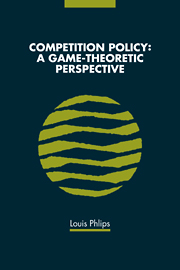10 - Collusion in R&D
Published online by Cambridge University Press: 23 September 2009
Summary
The policy question raised in this chapter is the following: should antitrust authorities authorise collusion, in particular joint ventures, in R&D? Competitors who are not allowed to collaborate in R&D might not invest enough, because innovations cannot be appropriated by the inventor: his competitors will copy the invention and thus ‘free ride’, that is, benefit from it without paying for it. However, competitors who are allowed to collude in R&D will have an incentive to also collude on the product market, restrict output and increase prices. In March 1985, the Commission gave a thirteen year block exemption under Article 85(3) of the Treaty of Rome, so that joint R&D ventures do not have to be notified to the Commission and exemptions do not have to be requested. Collusion on the product markets is not allowed, however. Was this a good decision? Intuition suggests that it was. Game theory confirms this intuition.
Joint R&D ventures have a number of organisational advantages and disadvantages (Jacquemin 1988). They are a flexible form of cooperation, compared to a merger, which would create rigid research structures. They allow firms to avoid the principal–agent problem which would arise if they had to work with external research contracts: with such contracts, it is difficult to monitor the agent's research efforts and to appropriate his findings. Joint ventures allow to spread risks and sunk costs among the participants, especially when there are indivisibilities. Above all, duplication of efforts can be avoided and complementary expertise can be combined.
- Type
- Chapter
- Information
- Competition PolicyA Game-Theoretic Perspective, pp. 173 - 182Publisher: Cambridge University PressPrint publication year: 1995



